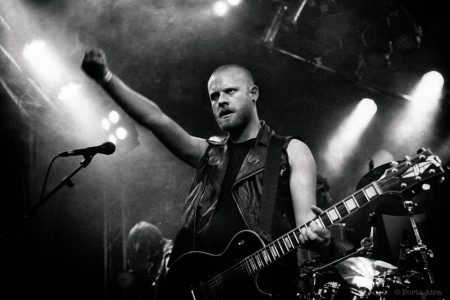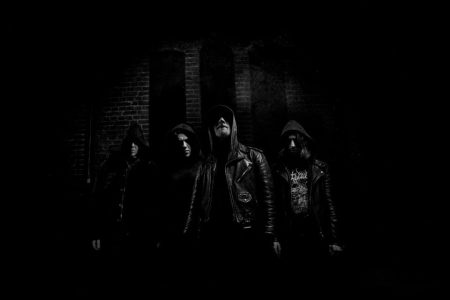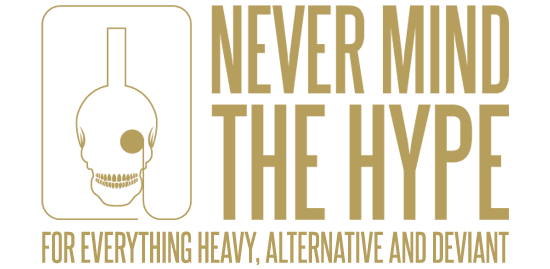
Krigeist in Tampere, foto Porta Atra (Source: Facebook page Barshasketh)
Most of the interviews with an artist is because of the release of an album, or relevant news that revolves the band. But, sometimes there is an artist that never sits still, continuously sharing news an works on a total of fourteen projects at the same time. Krigeist, also known as Andrew Campbell, plays in Barshasketh, Brón, Belliciste, Dunkelheit and who knows what other musical project he is involved in… Andrew carries out everything he does with enormous passion and dedication. Which is very fascinating if you keep in mind these are not only studio projects. Barshasketh visited the Netherlands several times and will be also present at the upcoming Dutch Deathfest 2020. Andrew found some gaps in his busy schedule for us to answer questions about his music, inspiration and how he keeps everything in balance, whilst traveling the world.
Text: Guido Segers
I was wondering if you could tell me about yourself. Where you originally are from and how you got involved with black metal and in so many projects.
“I’m originally from New Zealand, but I’ve not lived there in almost a decade now. I’ve relocated several times since I left, but I’ve now been based in Serbia for a few years. Since a young age, I’d been looking for a type of music that fits with what I had in my mind. I went through many phases searching for it, until I discovered black metal, which was everything I’d been searching for, both musically and ideologically. I got into the genre quite late I suppose, when I was around 18 or 19 years old. I think it was Dissection first, followed by Gorgoroth, Emperor, Mayhem as well as newer bands, such as those on the NoEvDia roster. From there it spiraled out of control until I was utterly consumed. Most of my own projects outside of Barshasketh started due to the fact that the material I had written didn’t suit any of my existing projects, so new ones were needed to accommodate them. The other projects I am involved with were a result of strong connections with other individuals. As well as the projects I’m involved with that already have releases, I’m working on a multitude of others which should see releases in the near future.”
How did Bashasketh get started and how would you describe the concept and idea you are expressing? For me, it feels like your themes and lyrics hold a high level of complexity, though the words themselves are very direct and strong.
“I started the band as a solo project around 12 years ago, almost concurrently with my discovery of black metal. Since then a number of members have come and gone, but the current lineup of GM, BB and MH and myself has become a lifetime brotherhood. When I started the band, it was a vehicle for me to explore and understand my spirituality and now it serves the same purpose for all four of us. As it’s a natural exploration of our paths through this sphere and beyond, it’s inevitably complex, as these things are never straight forward.”
I’m very curious what that spiritual aspect entails and what directions it has grown into. Could you tell more about what inspires you? And would you say other projects have sort of grown out of that personal journey?
“In the simplest terms, it’s an exploratory approach to the Left Hand Path. We don’t adhere to any specific school of thought, but rather use our own experiences, which we make sense of through our music and lyrics. With the creation of the last album, we have come to realize that this involves a continual cycle of destruction, purification and rebirth. Each time we throw ourselves deeper into the pit and the spirit is reborn in a stronger cast, with more knowledge and more certainty. The inspiration behind what led us to choose this path is something difficult to pinpoint, however, the reason we have chosen to follow it purely through our own experience was that it seemed to be the only honest way for us to do so. We believe that spiritual growth must come from within, hence we have shunned extraneous influences for the most part. I wouldn’t say this path has had a direct link on my other projects, although it has an effect on my existence as a whole, so there is undeniably some underlying influence on my other endeavors.”
You mentioned that the band is now a whole as such. Does this mean the creation of this latest album was more of a cooperative effort? And can you tell me more about the process?
“It was definitely more of a collaborative effort in some ways. As before, either GM or I would write all the guitars for a song, but this time BB and MK were left to write their own parts and put their own stamp on songs-so basically less dictation from our part. All members put forward ideas that were considered and taken on board. MK also contributed some synth parts and provided backing vocals, which was a first for us. Lyrically, I was responsible for the entirety of the lyrics (except for the Latin phrase in Recrudescence, which was the work of GM), but it was something that was discussed and reflected all of us. BB and MK have also led GM and I to feel less restricted in our songwriting, as they are more than able to handle anything we throw at them. As for the creative process, it was quite drawn out, with some of the songs being completed in their larval stages even before the release of Ophidian Henosis. As we are all separated geographically, there were months of sending material back and forward in various demo forms. If I recall correctly, the four of us were never in the same room during this process, but we did have one or two occasions with most of the members present to work out the finer details and experiment with structures. The lyrics came last and were a much quicker process, as the concept was firmly in my mind when I began writing. I feel I should say that a lot of the lyrics were written while in Hungary with the Inner Awakening Circle, so I must thank them for their inspiration.”
Can you tell me anything about the Inner Awakening Circle? And what made them so influential.
“The Inner Awakening Circle is a Hungarian group of individuals and bands including Lepra, Niedergang and Dunkelheit (who I’m now playing guitar for). They’re very serious about what they do and there’s absolutely no bullshit. The experiences I had with them pushed me out of my comfort zone and pulled me further down, and solidified my conviction that I’ve chosen the right path for me.”
Do you believe that this exploration, leaving the known behind, is essential for your art form as much as for personal growth? And are there instances you can describe to clarify how this has impacted your art and person with an anecdote?
“Yes definitely, the two are completely intertwined. The personal growth from these experiences is reflected in the music. The music is the medium through which we make sense of the exploration and experiences. As for specific instances or anecdotes, these are our own. All the things that we want to share in a public forum can be seen in our music and lyrics.”
So you said that during the creation of your latest record under Barshasketh, you were never together in a room. But then I’m really curious how the process took place and how you arrange things. I also was wondering what makes you as a person so unbound by a place and how you relate the change of home perhaps to the music or vision you describe. As I see it, this could be a form of exploration too.
“For the creation of the Barshasketh album, either GM or I would write all the guitars for a song, then we would send it to MK and BB to work out their drum and bass parts respectively. This involved a lot of sending demos back and forth until we were mostly satisfied. After that, when some of the members were able to get together, they would iron out details and small structural changes. It was quite an interesting way to do things as I’d often get one of my songs back sounding a lot different than I had originally had in mind. When it comes to the various changes in location, it was all circumstantial really. It was mostly moving from place to place in order to stay in Europe so that Barshasketh could remain active, just keeping my head above water. The places themselves never had an influence on Barshasketh, but I think the upheaval of having to leave certain places without much warning did. The various places I’ve lived is something that is expressed more through Brón than any other of my projects. Yeah, I was sort of steering in that direction because I’m very much fascinated by Bròn.
Can you tell me how that entity came into being and how it has shaped up to be as diverse as it is?
“As with all ‘side’ projects, Bròn came out of writing music that didn’t fit with any of my existing projects, both musically and thematically. Fògradh was written after I found out I would have to leave Scotland and it was inspired by my experiences living in that country. It was intended to be a one-off, but while living in Slovakia, shortly before moving to Serbia, Ànrach was written. The three songs deal with the influence that the natural environments of Scotland, New Zealand and Serbia had on me. It became clear at this point that this was a project dealing almost solely with the place. The diversity in material is due to the environment and the relationship to that environment that I’m expressing with each release. For example, the White City releases deals with Belgrade and day to day living in a huge urban expanse, which is quite far outside of my comfort zone. Black metal of any sort would simply have been an inappropriate medium to express those feelings. Ruins was unsurprisingly influenced by various ruins I have visited throughout Europe. Coming from New Zealand where such structures don’t exist, they had a profound impact on me. Again, black metal felt inappropriate, so a more folkish approach was taken. The black metal releases are invariably influenced by nature and an absence of human life, whether it be in New Zealand, Serbia or elsewhere. I always feel that Bròn is a very personal project, because it just feels very well-conceived and every release is very cohesive and ‘whole’.”
Is that how you envision it and how do you feel about the term side project, because I don’t feel that any of this is done with a lesser form of commitment and passion?
“All my projects are personal in their own right, they just express different aspects of myself. I have no problem with the term ‘side project’ as Barshasketh is more of an expression of my entire being and my perception of this sphere, whereas the other bands are intended to express one specific thing. Perhaps the fact that I share Barshasketh with people who are very meaningful to me makes it a more personal too.”
How does Belliciste fit into this whole world as well? As that does seem to stick more northernly, in language at least.
“As for Belliciste, this band also has no relation to place. It is an outlet for pure animalistic, reckless hatred with no bonds to anywhere in this world. The lyrics deal with the filthiest side of my spirit. Absolute misanthropy, apocalypse and the eradication of all life in this world. There are numerous references to deities from various mythologies, but these are not limited to those from the North. There are also many references to the Maori pantheon, most specifically Whiro, but I believe these all to be some sort of archetypes of the Devil, just through a different linguistic lens.”
Do you feel that your current projects and themes are for now it, or are you constantly finding new inspiration as you travel and explore and will new entities see the light of day?
“I think I’ve reached something as absurd as 14 individual projects now, so there is a lot of new material on the horizon. Some are black metal, others are not. Some are solo projects, some are with other people I’ve met over the years. These projects all stem from internal exploration and even just musical exploration, rather than anything geographic.”

Barshasketh
Ok, so I’d like to ask you if there are any ties you still have to the black metal scene in New Zealand and if there’s anything happening that you’d like people to be aware of?
“I never really had very strong ties to the NZ black metal scene, even while I lived there. I only knew and associated with a small handful of individuals, but I am still in contact with most of them and I’m even working on material with some of them. As for things happening within the NZ scene that people should be aware of, I guess most would already be familiar to those into black metal. Bands of note include Vassafor, Heresiarch, Vesicant, Ulcerate, Diocletian, Creeping. Lesser known bands include Winter Deluge, Exaltation, Vicissitude. I’m surely forgetting a few more…”
So what future plans do you currently have with your projects? What’s coming up next?
“A lot at the moment. I’m currently working on two Brón releases. One will likely be part of the White City series and the other is back to the black metal style, but this time features a real drummer. It’s being done in a proper studio setting, so things are moving slower than usual. Other than that, a few Barshasketh and Belliciste releases are in the works which should see the light of day soon. Dunkelheit and Svartgren albums have been finished and shouldn’t be too long either. The other projects are still being worked on, so news about those will follow. We have some exciting performances lined up for Barshasketh and Belliciste is also becoming more active in the live arena again.”

Nog geen reacties!
Er zijn nog geen reacties geplaatst.